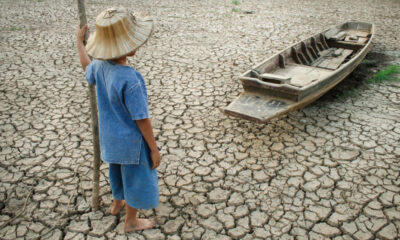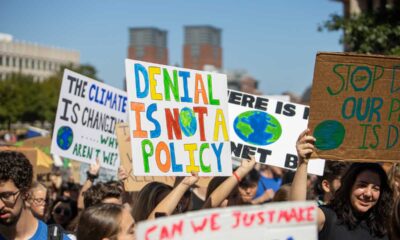Environment
Africa Unites to Push for Climate Justice

Partners Uniting to Sustain Our Community and Our World. Nairobi Declaration comes as UN chief warns that there is no time to lose in the global warming fight
By Xinhua
NAIROBI, Kenya — African countries ended a three-day summit in Nairobi, the capital of Kenya, on Sept 6 by adopting the Nairobi Declaration.
The declaration outlines the continent’s climate agenda, which includes the push for climate justice and the new models of climate financing.
Kenyan President William Ruto said the declaration will make the basis for Africa’s negotiations at the Sept 20 UN Climate Ambition Summit in New York and at COP28 in November in the United Arab Emirates.
“The Nairobi Declaration, our common stand and firm resolution, reaffirms our determination and sets the stage for a new phase in the global climate action and sustainable development agenda, giving the future of socioeconomic transformation a distinct and affirmative African character,” he said.

Ruto noted that the declaration defines and amplifies Africa’s position on the way forward in climate action, and the fundamentals that the international community must undertake to ensure that humanity’s economic and ecological imperatives are sustainably achieved.
He said the summit has successfully demonstrated that African solutions are not just appropriate for Africa’s problems but they are necessary for global well-being.
“Our Agenda 2063 is an agenda for the benefit of all humankind, and ‘The Africa We Want’ aligns with the planet we need. Africa is the future of the world,” he added.
Ruto observed that the leaders were leaving Nairobi satisfied that “it is a job well done, proud of the progress we have made and eager to embark on the next phase of transformation everywhere on our continent”.
He said Africa has emerged from the summit a winner, with a transformative partnership that will see the investment of $60 million over two years in expanding grid access in rural Burundi and a $4.5 billion commitment to boost renewable energy.
Moussa Faki Mahamat, the chairperson of the African Union Commission, said he will push to make climate change Africa’s theme of 2025/26, be institutionalized and the summit be held every two years.
Kgosientsho Ramokgopa, South Africa’s minister responsible for electricity, said that Africa can leverage its vast renewable energy resources, technology, and skilled manpower to produce green hydrogen for domestic consumption and export.
“By exploiting their untapped green hydrogen potential, African countries will decarbonize their economies and create jobs,” Ramokgopa said. Statistics from the Africa Green Hydrogen Alliance, an industry lobby comprising members such as Egypt, Kenya, Mauritania, Morocco, Namibia, and South Africa, indicate that green hydrogen demand on the continent could reach 18 metric tons by 2050.
Abdessalam Ould Mohamed Salah, minister of economy and sustainable development of Mauritania, said that green hydrogen will not only speed up the realization of net-zero targets in Africa but also lower the cost of manufacturing.
At the United Nations, UN Secretary-General Antonio Guterres warned on Sept 6 released a strongly worded statement on a record summer of global warming in the Northern Hemisphere, according to the European Union’s climate service Copernicus and the World Meteorological Organization.
“The dog days of summer are not just barking, they are biting,” he said, noting the hottest summer on record this year. “Climate breakdown has begun.”
“We can still avoid the worst of climate chaos — and we don’t have a moment to lose,” he said.













